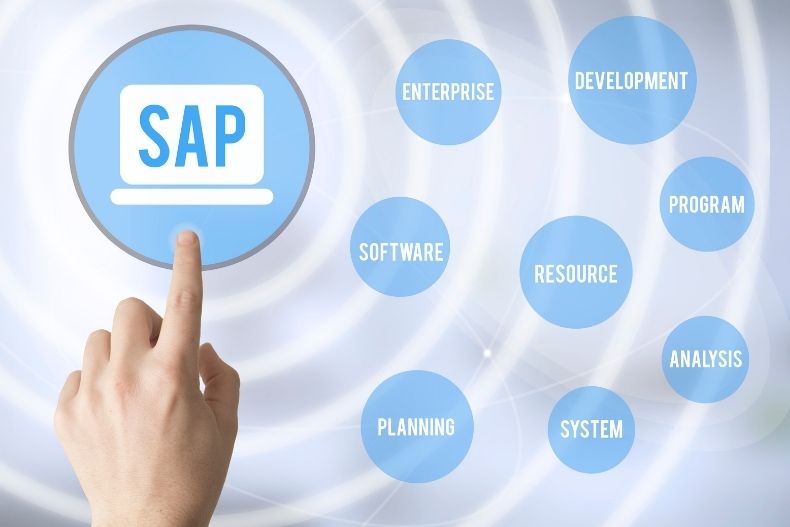Any business, no matter how large or small, can stand to benefit from utilizing technological resources to organize its everyday operations. Enterprise resource planning (ERP) systems are consolidated software applications that enable businesses to manage their most important functions and processes from one program. Sales, marketing, human resources, finance, and other essential departments can plan and communicate with one another in real-time through an ERP.
SAP, or Systems Applications and Products, is the most widely used ERP solution on the market today. Its main function is to collect and process data from every division within a business and consolidate it on a single platform. The software facilitates efficient interdepartmental communication and collaboration, making it easy for teams to share essential information and to take swift action based on what they learn.
Thousands of companies all over the world have benefited hugely from incorporating SAP systems into their current operational frameworks. Even in the Philippines, many companies have benefitted from implementing SAP into their business processes. A simple search of the keyword “SAP Philippines” on Google will show just how many local companies have relied on this innovative ERP system to transform their business. When it comes to their experiences of implementing and using SAP, Philippine-based companies generally report marked improvements in the following areas:

More Efficient Operations
Contemporary companies no longer need to dedicate manpower, time, and resources to performing the same manual tasks from day to day. You can now expedite many of these processes by using highly efficient technological alternatives like SAP. The software contains hundreds of integrated modules that allow you to manage financials, inventory, customer relations, project management, and other essential business functions more efficiently. It also comes with functions to help you streamline overly lengthy or convoluted traditional business processes, boosting overall company productivity.
Easy Scalability
Owners of small or medium-sized businesses may dream of one day expanding their operations, reaching more customers and raking in greater profits. The actual work of expansion, however, can significantly complicate a company’s functions in multiple ways. As they grow, companies will have to adjust their operations to manage more employees, utilize more technology, and manage higher volumes of market and customer data.
For the easiest and most productive possible transition, it’s best to invest in company-wide systems that can grow along with your business. SAP software, for instance, is designed to be fully scalable without requiring company leaders to make major changes at the grassroots level. You’ll easily be able to configure the software according to your organization’s current needs and scale it up or down smoothly as those needs evolve.
Enhanced Predictive Capabilities
Company managers must have access to detailed, accurate, and up-to-date information about their business in order to accurately assess present performance and chart a course for the future.
SAP systems can provide you and your staff with the data you need to generate productive business insights and develop the best possible company forecasts. A comprehensive, real-time view of company sales, profits, and other essential facts and figures will help you craft realistic evaluations of your business and make strategic and informed decisions.
More Organized Data Management
Data is an increasingly powerful and profitable resource in the current business environment, where demands from customers, regulators, and the market at large can change at dizzying speeds. A company needs to be able to not only gather large amounts of data, but also to interpret it efficiently and accurately.
Given the immense value of clean and complete data, some of SAP’s most well-used features are functions specifically designed to streamline a company’s data management processes. SAP systems consolidate business information in one secure, centralized database instead of spreading it out across multiple fragmented, uncoordinated data silos.
Greater Business Agility
A company’s success often depends upon its ability to respond swiftly to changing trends and emerging issues. It’s companies that showcase superior levels of flexibility and business agility that are best able to provide their target audience with anything they need, when they need it.
SAP is designed to enhance a company’s flexibility by facilitating more effective internal communication and data exchange across the entire enterprise. Using the software, multiple departments can observe market changes occurring in real time and work together to devise productive plans of action.
Most SAP systems are also designed modularly, with a host of configurable settings, modules, and add-ons designed to address any business need. The software is thus highly capable of providing you with ready-to-implement solutions to any issues or limitations your business might encounter.
Lower IT Costs
Patching your company’s operations with multiple hardware and software solutions is both expensive and labor-intensive. For businesses looking to maximize productivity while minimizing IT costs, SAP is an ideal solution. Its streamlined systems and comprehensive business management toolkit affords companies the greatest possible value for money. The unified nature of the platform also makes it much easier to upgrade and maintain than more fragmented solutions.
Whether you run a small homegrown enterprise or a large multinational corporation, you can feel confident centering your organization’s technological infrastructure on an SAP system. No other ERP system is designed to cater so granularly to the specific needs and concerns of its end users. With the multitudes of options that SAP places at your disposal, the possible ways your company might use the system to do better business are endless.